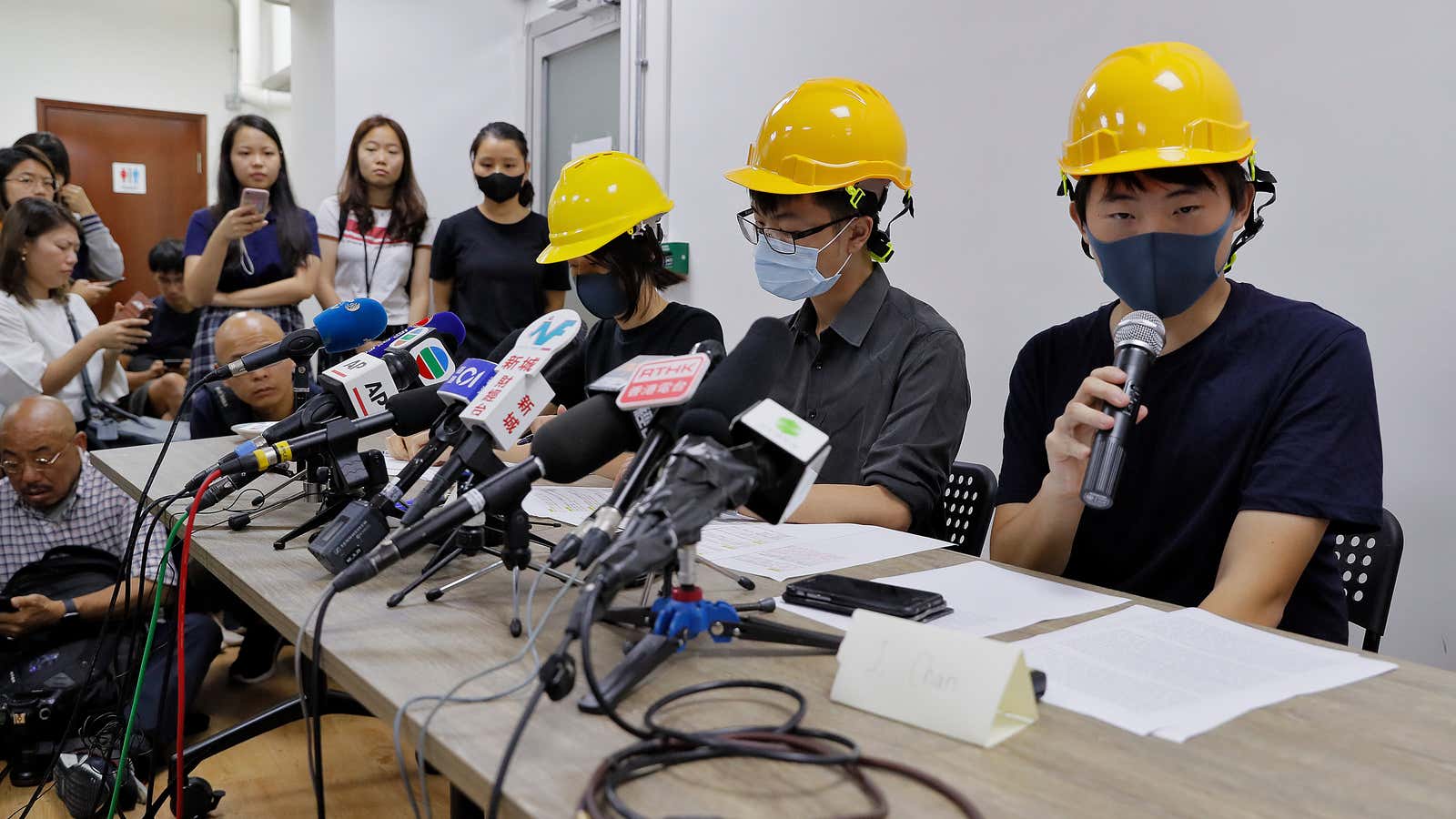After weeks of cookie-cutter government press conferences—widely perceived to be so predictable at this point in their blanket condemnation of demonstrators and outright refusal to address citizens’ demands that bingo sheets have been made—some protesters have retaliated with a media briefing of their own.
Wearing protesters’ signature yellow hardhats and surgical face masks, Jerry Chan, Linus Kim, and Mary Tsang—who only identified themselves as members of the popular local online forum LIHKG—addressed the media today (Aug. 6) in what Chan called the inaugural “civil press conference.” They said it was a deliberate and strategic attempt to push back against the government’s one-sided and often distorted narrative, and to act as a counterweight to the government’s monopoly on political discourse.
LIHKG is a Reddit-like platform that has become the leading forum for Hong Kongers to discuss everything from protest logistics to the broader political aims of the movement. While openly accessible to anyone, content is almost exclusively in Chinese, and users must open an account—using only either an email address from a local ISP or higher education institution—in order to create threads or upvote and downvote a post. Throughout the past nine weeks of protests, which began in opposition to an extradition bill and have since grown to include broader demands for democracy and accountability, LIHKG has functioned as a kind of hive mind, facilitating the coordination of guerilla-style plans. And it also serves as a kind of barometer of what protesters are thinking.
At a press conference yesterday (Aug. 5) shortly after protesters kicked off their actions to paralyze public transport alongside a general strike, chief executive Carrie Lam, in her first media appearance in two weeks, again strongly condemned the violence and disruption caused by protesters, but failed to offer any kind of solution to the most severe political crisis afflicting Hong Kong in decades. Many have criticized her for her prolonged absence from public view, some cheekily suggesting that she, too, was on strike.
Lam did offer something different—a new communication strategy under which the police would hold a press conference every day. But the rest of the briefing was tellingly lacking in any kind of proposal for how to resolve the deep-rooted socioeconomic causes that have fueled people’s anger and frustration with the government. Instead, Lam recycled old talking points that the government had already adequately responded to protester demands by suspending the extradition bill, and that in any case protesters were merely using the bill as a cover for their “ulterior motives”—namely, to foment revolution and destroy Hong Kong.
And so protesters, fed up with what they see as negligence and intransigence on the part of the government, have decided to reclaim control of the narrative and push back against the government’s public relations blitz. They are also countering what they see as a pro-China tilt in many local mainstream media outlets, including the city’s dominant broadcaster, TVB.
The grassroots PR effort, hastily cobbled together within a day and conducted in both Cantonese and English, is much like other crowdsourced initiatives that have sustained the protest movement thus far.
“After disappearing from the public domain for 11 days, Mrs. Lam and her administration finally came out of hiding yesterday,” said Chan, adding that people are “saddened” by the “distortion of the facts” by the government and that it would do better not to waste resources and energy on daily media briefings.
The largely leaderless nature of the protest movement has been both a strength and a weakness, and this was again evident at the protesters’ press conference today. Asked repeatedly by journalists about how and why they can claim to be representative of the protest movement, the speakers said that they merely function as a platform for people’s voices—much like the LIHKG forum itself. They insisted that they are not leaders of the movement, but are trying to pool public views and speak for the average protester.
“In these chaotic times, we need to be able to clearly identify black and white,” said Kim.
